Following the successful conference on the “Sustainability Goals implementation in the Era of Digitalisation in North African Countries” involving a team of colleagues i.e. Dr Julie Robson, Dr Kaouther Kooli and Dr Elvira Bolat (details here), once again Bournemouth University successfully collaborated with the Manouba University, the Laboratory LIGUE and the APIQ-ISCAE, to organize the 4th Edition of the LIGUE International Conference held in Tunis, on a very timely and interesting conference addressing the “Deep Transformation and the Future of Organisations”, the 6&7 December 2019. More than 240 academics in all fields of business science and practitioners have participated to this interdisciplinary event and more than 60 blind reviewed communications and talks have been presented. In addition to the papers’ presentation sessions, 2 special sessions and 4 workshops have been organised around sustainability issues in the textile sector, Case studies, General Data Protection Regulation, Governance in local collectivities, Methodology and Critical thinking. 
| Opening Ceremony Panel : Professor Jouhaina Gharib (Chair of the University of Manouba), Professor Hamadi Matoussi (Founder of the LIGUE laboratory and Co-Chair of the conference), Professor Salma Damak (University of Carthage, Chair of the conference), Professor Hamida Skandrani ( University of Manouba, Chair of the LIGUE laboratory), and Dr Malek Sghaier ( Lecturer, Opening the ceremony) |
This Fourth Edition of The LIGUE Conference was also an occasion to celebrate the 20th anniversary of the Laboratory LIGUE to witch the Bournemouth took part.
 |
 |
 |
| Team BU (Sangeeta Khorana, Ediz Akcay, Kaouther Kooli, Hiroko Oe) and festive events : Christmas in Tunis and the 20th anniversary of the LIGUE laboratory |
This year’s conference took a multidisciplinary perspective to provide insight from marketing, management, accounting, finance and corporate governance on key issues challenging organisations. In addition to the issues of sustainability, other themes were explored providing insight on issues challenging the future of organisations. This conference is supported by several organisations i.e. The University of Manouba, Bournemouth University, the Associations for the Promotion of Innovation & Quality (APIQ) la quality, Tunisia), the Academy of Marketing B2B Marketing Special Interest Group.
In addition to the plenary sessions held on the morning of the 6th December 2019, interesting papers were presented and discussed during the two-day conference. Best papers are being selected for the review process of ranked journals (ABS, CNRS, FNEJ, ABCD).
Professor Michael Baker (Editor of the Journal of Customer Behaviour and Social Business), Professor David Lichtendhal, Editor of the Journal of Business to Business Marketing, Dr David Lindridge (Editor of Qualitative Market Research- an International Journal), Professor Hajj Nekka (Editor of RISO ), Professor Khaled Hussainey and Professor Aziz Jaafar (Editors of the Journal of Financial Reporting and Accounting), Professor Nadia Albu (Editor of Journal of Accounting And Management Information System), Professor Han Donker and Dr. Saif Zahir (Editor of International Journal Of Corporate Governance), Dr Elise Penalva Icher (Editor of ROR), Prof Olivier Joffre and Stephane Tebuq (Editors of Recherche et cas en sciences de gestion).
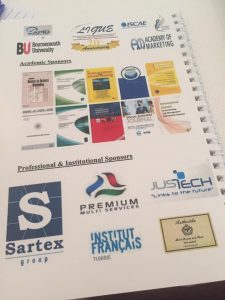
On behalf of Bournemouth University, the Academy of Marketing B2B marketing special interest group, our special partner the LIGUE laboratory, I would like to express my gratitude to their dedication to enhance and support academic research not only in the UK but also in Tunisia.
The conference also involved practitioners in many ways i.e. workshops and presentations. I would like to express my gratitude to all the organisations that have supported this event, special thanks go to Sartex (from the Tunisian Textile and Clothing industry), PREMIUM Multiservices, Institut Francais, Justtech Links to the Future.- PMF, Authentika and the American Chamber of Commerce Centre Chapter.
 |
| Mrs Jasenka Lutjik, American Chamber of Commerce Centre Chaptre (Tunisia) |
Please find below a few examples of this conference’s achievements :
- A plenary session with key speech from Professor Sangeeta Khorana, Bournemouth University, addressing the future of international trade in the era of blockchain and bitcoins and Professor Hajj Nekka, Angers University, (France) of Human Resource Management in the era of societal transformations: a critical view Moderator
 |
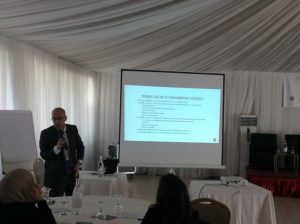 |
| Professor Sangeeta Khorana (Bournemouth University), Professor Wafa Khilf, chairing the plenary session, Toulouse Business School, Spain, Professor Hajj Nekka (Angers University, France) |
2-A plenary session organised by Dr Kaouther Kooli and focusing on the Textile and Clothing industry. Bournemouth University, the University of Manouba and the University of Florence have established the on-going global debate on the pollution caused by the global textile and clothing industry as featured by so many international conferences e.g. the Sustainable Apparel and Textile Conference that will be held in Amsterdam in April 2020, the International Conference on Global Textile Industry, Regulatory Standards and Regulation in London in January 2020.

This session provided insight on sustainability in the textile and clothing industry and involved academics and practitioners:
- A young team including Nour Jmour, chemical engineer and Malek Zaguia, director of Communication both represented Sartex, one of the most important players in Africa in the textile and clothing industry with more than 5000 employees. They provided insight on the Sustainability activities performed by Sartex.
 |
| Malek Zaguia, Director of Communication and Nour Jmour, Engineer (SARTEX) |
- Professor Patrizia Zagnioli from the University of Florence (Italy), gave insight on the sustainability activities performed in Prato, the second biggest district of Textile and clothing industry in the world and the first in Europe.
 |
| Professor Patrizia Zagnoli, the University of Florence. |
- Dr Hiroko Oe presented the potential of implementations of ICT to the B2B and B2C relationships. She emphasised the positive impact of ICT in enhancing the collaboration between businesses and consumers in the globalised era. She also added that in sustaining the small and medium sized textile firms, more active discussions on how to design roadmaps in responding to the UN Sustainable Development Goals are important.
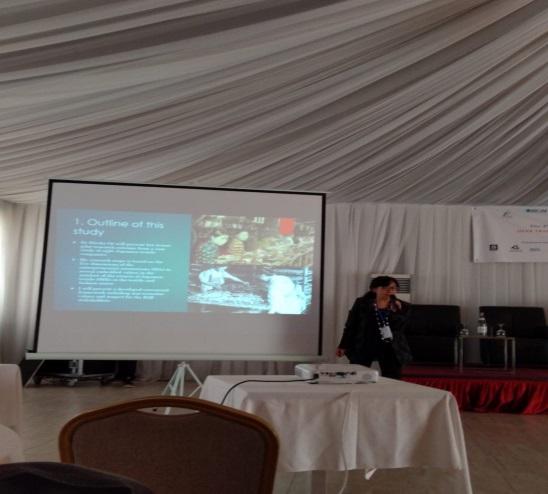 |
| Dr Hiroko Oe, Bournemouth University |
- Professor Hamida Skandrani, Dr Kaouther Kooli, addressed the cultural influence on the implementation of the UN sustainability goals, from the perspective of the Tunisian textile and clothing industry. This presentation also involved Ana Paula Teixeira, a BU postgraduate student that contributed to the data collection during her internship in the summer 2019.
 |
| Professor Hamida Skandrani, University of Manouba and Dr Kaouther Kooli, Bournemouth University
|
This session was very successful and gave an international perspective on the issues of sustainability in the textile and clothing industry. Research papers and research funding proposals are being developed based on very rich information produced in this session. Potential partners from practice and from academia have been identified and initial contacts have been made.
In addition to this session, papers addressing sustainability issues in different contexts have been presented during the two days.
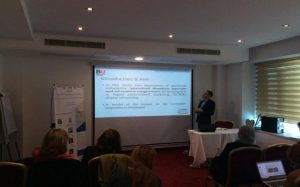 |
| Ediz Akcay, Bournemouth University. |
As the Chair of the Academy of Marketing B2B Marketing special interest group, Dr Kaouther Organised an insightful session on how B2B marketers reach customers in the era of GDPR. Is GDPR as relevant for Tunisia as for the UK? Yes definitely. A video conference was organised with very strong contribution from Bournemouth University.Professor Sangeeta Khorana commented about the outcomes of the discussion. The session was facilitated in Tunisia by Dr Hiroko Oe, Ediz Akcay and Dr Kaouther Kooli. In the UK (EBC), the session was facilitated by Dr Elvira Bolat, Dr Mili Shrivastava and Dr Danny Liang. As well as constituting a proof that it is possible to run a Carbone zero conference, this session provided interesting and deep insight into how each marketer approached the issue of GDPR.The General Data Protection Regulation 2016/679 (GDPR) is a regulation in EU law on data protection and privacy for all individual citizens of the European Union and the European Economic Area. It also addresses the transfer of personal data outside the EU and EEA areas GDPR present new challenges for B2B firms in both countries. In the UK, businesses have to comply with the regulation when building their databases and contacted new customers. Although Tunisia is not the EU, most of its international trade is done with the EU. In addition the Tunisian legal framework emphasise GDPR as a key issue for organisations in Tunisia (details here). B2B marketers from Tunisia and the UK met together via video conference to discuss and share views on how GDPR is affecting the way they reach potential customers.
Professor Sangeeta Khorana commented about the outcomes of the discussion. The session was facilitated in Tunisia by Dr Hiroko Oe, Ediz Akcay and Dr Kaouther Kooli. In the UK (EBC), the session was facilitated by Dr Elvira Bolat, Dr Mili Shrivastava and Dr Danny Liang.
As well as constituting a proof that it is possible to run a Carbone zero conference, this session provided interesting and deep insight into how each marketer approached the issue of GDPR.
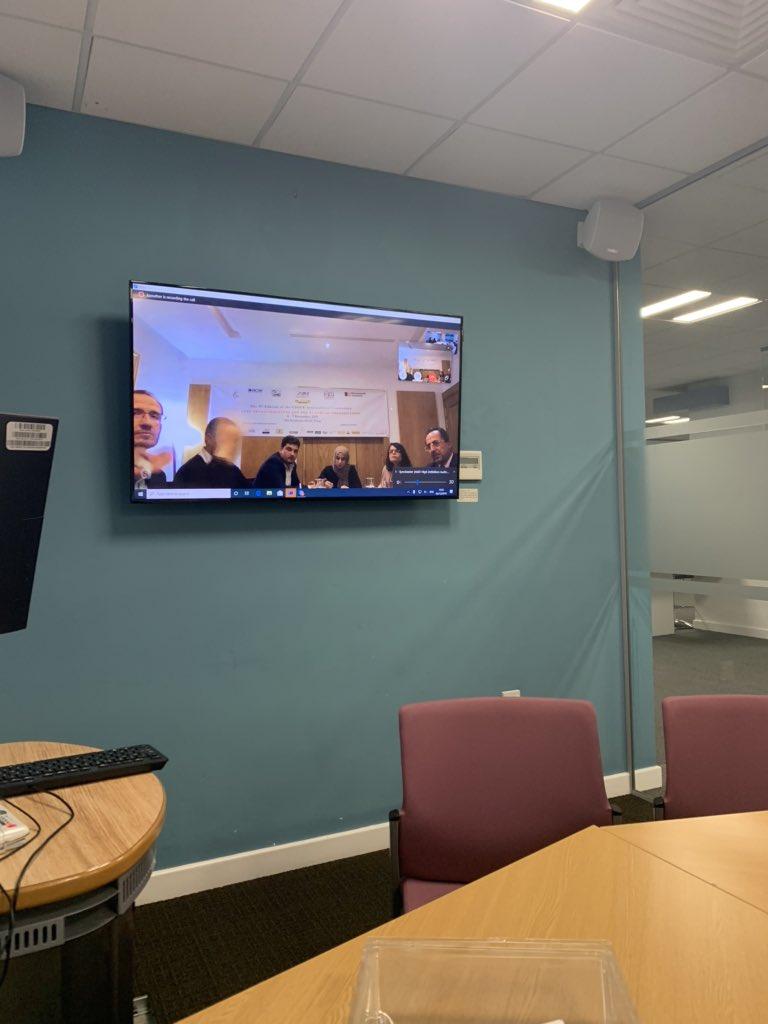 |
|
|
 |
|
 |
|
| Video Conference: How B2B marketers reach their customers in the era of GDPR? |
|
| Participant from Tunisia
Malek Zaguia, Sartex
Nour Jmour, Sartex
Nawal Ayadi, Paris Dauphine
Nebil Belaam, Emrhod Consulting
Nizar Nouiri, Factory 619 |
Participants from the UK
David John, Regional Manager, Eriks (Confirmed)
Timothy Foxx Neal, Digital Marketing Executive, Squire Technology (Confirmed)
Pauline Dean, Procurement Category Manager, BU
Fred Fowler, Founder, Core Computers. (Confirmed)
Ana Paula Teixeira, free lance Digital B2B marketer. |
|
4-Professor Salma Damak (University of Carthage, Tunisia) and Professor Samir Trabelsi (Brock University, Canada)organised a very interesting session on
Governance and financial transparency of local authorities.
In the presence of elected representatives of the local authorities, the session was dedicated to governance and financial transparency. Pr Damak presented the Tunisian regulatory framework for the management of local authorities and insisted on the need to comply with international accounting standards for financial reporting for public entities (IPSAS)
Pr Samir exposed the challenges of local governance in a moving context especially for a country in political transition phase. He proposed some recommendations in order to improve the governance of local communities while preserving local specificities.
 |
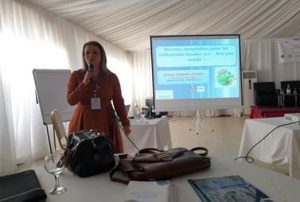 |
| Professor Samir Trabelsi, Brock University, Canada |
Professor Salma Damak, University of Carthage, Tunisia |
5- Professor Wafa Khlif, Toulouse Business School, Spain, organised a special session on critical thinking and the ability to engage in reflective and independent thinking. Pr Khlif exposed the various skills that we need in order to be able to think critically (observation, analysis, interpretation, reflection, evaluation, inference, explanation, problem solving, and decision making)
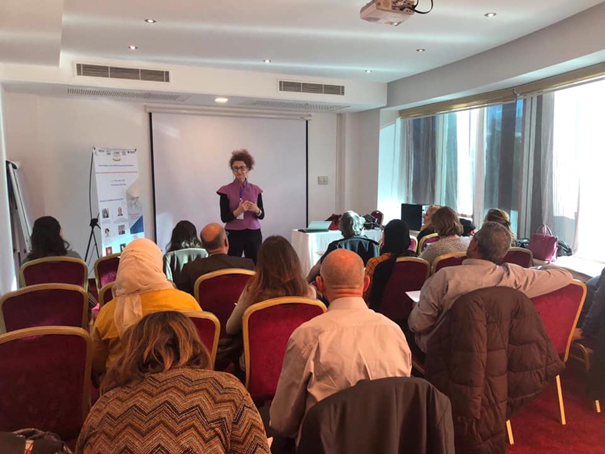 |
| Professor Wafa Khlif, Toulouse Business School, Spain |
6 – Last but not least, a visit to Sartex was arranged the day after the conference. Professor Hamida Skandrani, Professor Sangeeta Khorana, Professor Patrizia Zagnoli and Dr Kaouther Kooli met with Mr Mounir Zarrad, Mr Ibrahim Zarrad, Mr Malek Zaguia and Ms Nour Jmour.
After a guided tour of the premises and the water plant, a meeting was held at Sartex to discuss future collaborations on research, education and bids for research funding.
|
Dr Kaouther Kooli, Mr Mounir Zarrad and Professor Sangeeta Khorana, Mr Malek Zaguia and Professor Patrizia Zagnoli and Mr Ibrahim Zarrad, tour and meeting at Sartex. |
|
|
|
|
Finally, Dr Hiroko Oe and Ediz Akcay, academics from Bournemouth University, including ECRs, have the opportunity to undertake guest editing work for ABS ranked journals.
The special issues of all the journals supporting the event will be promoted at Bournemouth University and submissions will be welcomed.
If you need further information, please feel free to contact Kaouther Kooli : kkooli@bournemouth.ac.uk
in the meantime, special thanks go to Professor Hamida Skandrani, Professor Salama Damak, the big boss Dr Hanen Moalla and Dr Rihab Zorii for their dedication before, during and after the conference.
 |
|
 |
| Dr Rihab Zorii and Professor Hamida Skandrani
|
|
Professor Hamida Skandrani (University of Manouba and Chair of the LIGUE laboratory) and Professor Salma Damak (University of Carthage) happily supporting each other before going live on one of the national radios (RTCI Chaine Internationale) to promote the conference.
|
For more pictures, please join us on :
https://www.facebook.com/pg/Colloque-International-du-LIGUE-1418556165078154/photos/?ref=page_internal
Looking forward to receiving your feedback and to updating you on the next conference.
Dr Kaouther Kooli
Principal Academic in Marketing
Business School, Bournemouth University

 Dr Kip Jones, Reader in Qualitative Research and Performative Social Science retires from Bournemouth University at the end of February, but will continue with PhD supervision on a part-time basis. He has four potential publications in discussion with publishers, including a volume on PSS.
Dr Kip Jones, Reader in Qualitative Research and Performative Social Science retires from Bournemouth University at the end of February, but will continue with PhD supervision on a part-time basis. He has four potential publications in discussion with publishers, including a volume on PSS. 

 pines.
pines.







































 New Nepal scoping review on maternal & neonatal health
New Nepal scoping review on maternal & neonatal health Fourth INRC Symposium: From Clinical Applications to Neuro-Inspired Computation
Fourth INRC Symposium: From Clinical Applications to Neuro-Inspired Computation Writing policy briefs
Writing policy briefs Upholding Excellence: The Concordat to Support Research Integrity
Upholding Excellence: The Concordat to Support Research Integrity ECR Funding Open Call: Research Culture & Community Grant – Application Deadline Friday 12 December
ECR Funding Open Call: Research Culture & Community Grant – Application Deadline Friday 12 December MSCA Postdoctoral Fellowships 2025 Call
MSCA Postdoctoral Fellowships 2025 Call ERC Advanced Grant 2025 Webinar
ERC Advanced Grant 2025 Webinar Horizon Europe Work Programme 2025 Published
Horizon Europe Work Programme 2025 Published Horizon Europe 2025 Work Programme pre-Published
Horizon Europe 2025 Work Programme pre-Published Update on UKRO services
Update on UKRO services European research project exploring use of ‘virtual twins’ to better manage metabolic associated fatty liver disease
European research project exploring use of ‘virtual twins’ to better manage metabolic associated fatty liver disease